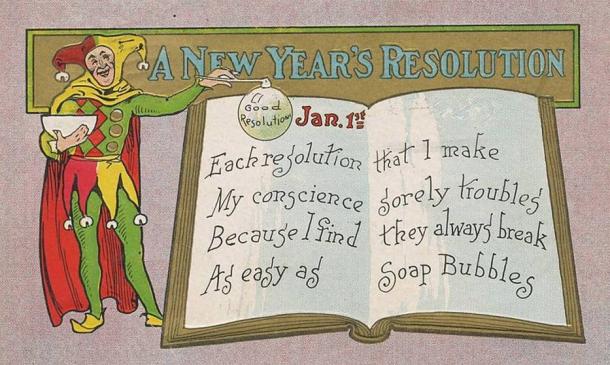A resolution is a firm decision to do or not to do something. As such, you can make a resolution any old day. You needn’t wait for New Year’s resolutions.
In practice, people tend to make resolutions when something personally significant happens: birthdays, anniversaries, birth of a child, death of a loved one, when celebrating a big achievement or suffering a major defeat…
But New Year’s Day is the single most popular day to do so. Based on the average of five studies, 38.5% of U.S. adults make New Year’s resolutions. Younger adults are more likely than older adults to do so.
Why this day? “The New Year offers a blank slate — an opportunity to get things right. When we set New Year’s resolutions, we are utilizing a very important concept called self-efficacy, which means that by virtue of aspiring to a goal and following through on it, I have a sense of control over what’s happening in my life.” (Piedmont.org)
New Year’s Resolutions Then
New Year’s resolutions aren’t a new thing. According to Merriam-Webster, the practice has been around since the early 19th century, and perhaps as far back as the late 17th century. Anne Halkett wrote a number of “Resolutions” in her diary on January 2nd, 1671.

On the other hand, History.com says the ancient Babylonians were making New Year’s resolutions 4,000 years ago. They also held the first recorded celebrations of the new year, called Akitu—though for them the year began in mid-March. They made promises to the gods to pay their debts and return any objects they had borrowed.
When Julius Ceasar established the Julian calendar circa 46 BCE, he named the first month of the year after the god Janus, who looked both backward and forward. Romans believed that if Janus had seen them making improvements in their lives during the previous year, they could start the new year with a clean slate. At New Year celebrations, Romans made offerings to Janus and promised the god that they would behave better.

from the Codex Manesse, c. 1304
Inspired by a 1312 poem by Jacques de Longuyon, medieval knights began the practice of taking the Vow of the Peacock (les voeux du paon) at New Year banquets. During the presentation of the subtlety (a special dish designed for visual or entertainment value more than actual nutritional value), people frequently made boasts, pleadges, and vows. When the host presented a roast peacock at a New Year feast, dressed in its own plumage, knights would vow upon the bird to uphold the values of chivalry.
For early Christians, at least as far back as 1740, the first day of the new year was the time to think about one’s past sins and resolve to do and be better in the future. John Wesley, an English clergyman and founder of Methodism, held a Covenant Renewal Service in 1740. Many Christian communities still hold Watch Night services overnight on New Year’s Eve.

The Jewish calendar begins with the High Holy Days (יָמִים נוֹרָאִים), running from Rosh HaShanah (רֹאשׁ הַשָּׁנָה) to Yom Kippur (יָמִים נוֹרָאִים). During the ten days between, people work to improve the judgement presented upon their actions during the previous year. They seek atonement, donate to charity, and ask forgiveness from those they have wronged. Many Rosh HaShanah and Yom Kippur customs, including wearing white and eating honey with apples, originated in the Middle Ages among the Ashkenazi community.
New Year’s Resolutions Now
Now, of course, New Year’s celebrations are mostly secular and resolutions are usually promises to oneself. The most common resolutions are to continue good practices, change an undesired trait or behavior, accomplish a personal goal, or otherwise improve their behavior. In particular, according to 413 U.S. adults (18-89 y/o) surveyed Oct. 25-Nov. 2, 2022, who intended to make one or more resolutions (Source: Statista Global Consumer Survey);

- To exercise more, 52%
- To eat healthier, 50%
- To lose weight, 40%
- To save more money, 39%
- To spend more time with family/friends, 37%
- To spend less time on social media, 20%
- To reduce stress on the job, 19%
- To reduce spending on living expenses, 19%
But note: according to Discover Happy Habits, only 23% of survey participants planned on making new years resolutions for 2023. And the most popular resolutions for the coming year are living healthier (23%), personal improvement and happiness (21%), and losing weight (20%).
Twelve percent of new gym memberships are created in January. Sales of healthy food spike by nearly 30% in January every year, though sales of junk food do not diminish much during the same period.
Keeping New Year’s Resolutions
But why bother? Do resolutions really work? Of those who make New Year’s resolutions, after 1 week 75% are still successful in keeping it. After two weeks, the number drops to 71%. After 1 month, the number drops again to 64%. After 6 months, 46% of people who make a resolution are still successful in keeping it. And by year’s end, only 9% are successful. (Medical News Today)
To increase your chances of success (according to various things I’ve heard or read):
- Be specific. (Lose XX pounds vs. lose weight)
- Write it down.
- Make it public.
- Start small to see success early.
- Consider the steps it will take to reach your goal.
- Track your progress.
If you are tired of the same-old, same-old, consider some more unusual resolutions. In 2016, I shared suggestions for New Year’s resolutions for writers. Real Buzz published some more suggestions for unusual New Year’s resolutions, including the following:
- Take your photo in five interesting places
- Learn a decent party trick
- Break a record
- Make a new friend each month
- Develop a good relationship with your body
- Learn something you didn’t learn as a child
- Try new food each week
- Make the usual unusual
- Sort out financial worries
- Do something nice for someone else every day
BOTTOM LINE: To resolve or not? And remember, anytime, anything. Make it your own.


